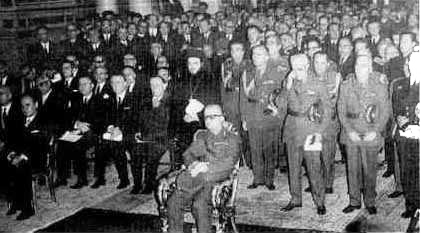Breaking news! Pope John Paul II is to become a saint!
To become a saint in the Catholic Church, you must go through 4 steps, the last two being "beatification" and "canonization", each requiring that you perform a miracle. The church, taking a skeptical position, established a few centuries ago (1578 to be exact) the concept of "devil's advocate":
The plot was created from a list of saints by Pope. We make the assumption that once someone becomes saint, he or she stays saint forever. Up to 2013, the growth is approximated by an exponential function. This is due to Pope John Paul II who canonized 483 saints. Previous popes, from 1800 up to Pope John Paul II had canonized 242 saints altogether. Pope Benedict XVI was more cautious; he canonized 45 saints. Pope Francis started the papacy with dynamism. In his first year, he canonized 802 saints en masse. We can therefore not approximate the last part of the growth by a classical function. Only a generalized function works. If you have trouble with the concept of a delta function, here is an application which will make you understand it well. Thanks to the current pope.
To become a saint in the Catholic Church, you must go through 4 steps, the last two being "beatification" and "canonization", each requiring that you perform a miracle. The church, taking a skeptical position, established a few centuries ago (1578 to be exact) the concept of "devil's advocate":
During the canonization process of the Catholic Church, the Promoter of the Faith (Latin: promotor fidei), popularly known as the Devil's advocate (Latin: advocatus diaboli), was a canon lawyer appointed by Church authorities to argue against the canonization of a candidate. It was this person’s job to take a skeptical view of the candidate's character, to look for holes in the evidence, to argue that any miracles attributed to the candidate were fraudulent, and so on. The Devil's advocate opposed God's advocate (Latin: advocatus Dei; also known as the Promoter of the Cause), whose task was to make the argument in favor of canonization. This task is now performed by the Promoter of Justice (promotor iustitiae), who is in charge of examining how accurate is the inquiry on the saintliness of the candidate. (From Wikipedia.)The concept was abolished in 1983 by Pope John Paul II. He then started a fast process of canonization of a huge number of individuals. Let us see how the abolishment of devil's advocate affected the number of saints from 1800 onwards. A "scientific approach" helps here.









